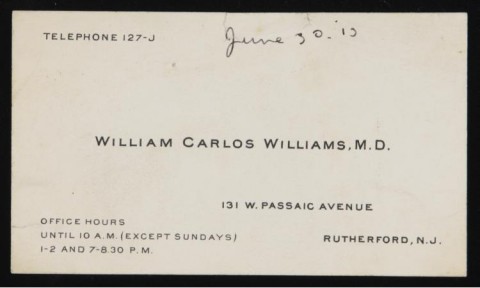There you have it: the business card of William Carlos Williams. Yes, that William Carlos Williams. Imagist poet, novelist, playwright, essayist, critic, writer of short stories — and New Jersey pediatrician. Would any of us, upon reading his written work, have advised him not to quit his day job? And yet quit it he did not, practicing medicine by day and writing in the evenings. Given that his office hours evidently ran to 8:30 p.m., he must have spent some seriously late nights at his desk. But because Williams burnt the candle at both ends, we may today enjoy poems like The Red Wheelbarrow, This is Just to Say, and the vastly longer Paterson, an adaptation into verse of the city of Paterson, New Jersey. Such poems show that the concrete and the everyday — just the things you’d expect a small-town family doctor to deal with — never escaped Williams’ attention. Critics tend to cite one phrase from Paterson that sums up this sensibility: “No ideas but in things.”
In the clip just above, you can hear Allen Ginsberg, a friend of Williams but a decidedly more bohemian sort, read from Williams’ Spring and All. It certainly seems possible that the poet’s maintenance of a day job and all its trappings of the non-poetic life not only failed to hamper but actually fueled his writing. Wallace Stevens, another poet who famously held a seemingly mundane parallel career, said as much about his own traditional employment. He credited the daily walk to his lawyer’s job at the American Bonding Company, and later the Hartford Accident and Indemnity Company, with providing the mental space that made what we think of as his lasting work possible. This work led to a Pulitzer Prize in 1955. An offer of a place on Harvard’s faculty followed, but he turned it down. Sometimes we simply hit upon a lifestyle that lets us express what we need to express. Did Stevens’ lifestyle work for him? Have a listen to him reading Final Soliloquy of the Interior Paramour. Perhaps the results speak for themselves:
A special thanks goes to Steve Silberman (aka @stevesilberman) for sending Williams’ business card our way.
Related content:
William Carlos Williams Reads His Poetry (1954)
101 Early Wallace Stevens Poems on Free Audio
Harold Bloom Recites ‘Tea at the Palaz of Hoon’ by Wallace Stevens
Colin Marshall hosts and produces Notebook on Cities and Culture. Follow him on Twitter at @colinmarshall.



Leave a Reply